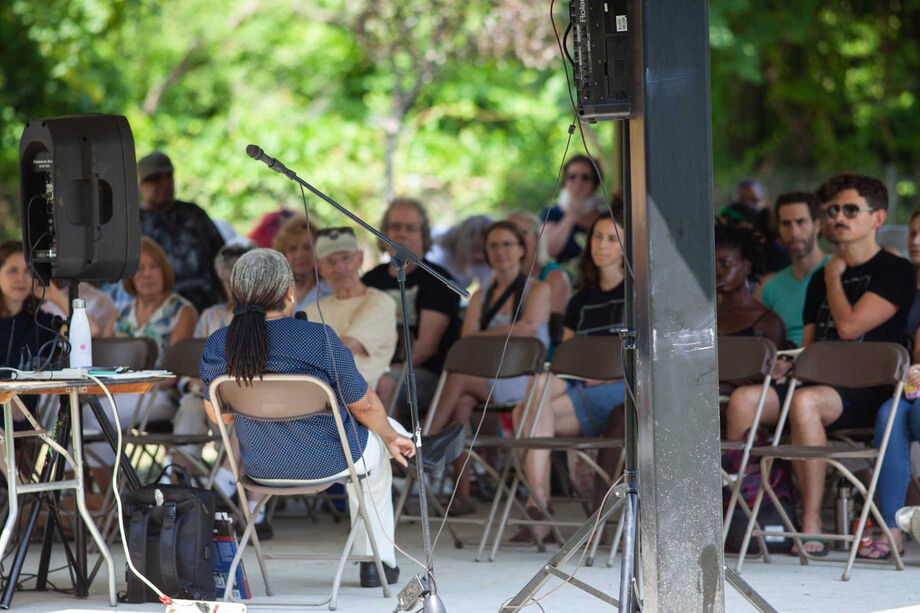
Each summer, a lecture series hosted by The Mastheads provides the Pittsfield, Pennsylvania, community with a chance to come together. Image courtesy of The Mastheads.
NEH funding builds strong, civically-engaged communities through its support of cultural organizations. The agency’s grantmaking helps establish and sustain robust community institutions, providing opportunities for learning, empathy, and understanding.
of respondents to a post-program survey said they were “motivated to listen to the stories of people whose background was different from their own” after participating in a conversation hosted by the International Storytelling Center.
of respondents agreed or strongly agreed that a lecture hosted by The Mastheads “enhanced [their] appreciation of Pittsfield’s history.”
NEH funding helps communities explore and understand their local histories. Hosted by the International Storytelling Center in Jonesborough, Tennessee, “Freedom Stories: Unearthing the Black Heritage of Appalachia” featured discussions by Black storytellers, scholars, and community leaders. Ninety-three percent of respondents to a post-program survey indicated that they were “motivated to listen to the stories of people whose background was different from their own after participating in this program.” And The Mastheads, a humanities organization in Pittsfield, Massachusetts, offered a series of community conversations on the region’s rich and diverse past, including a lecture from local historian Dr. Frances Jones-Sneed titled “Black Artists Who Found Their Voices in the Berkshires.” In survey responses, 95 percent of respondents agreed or strongly agreed that “the program enhanced [their] appreciation of Pittsfield’s history.”
of respondents agreed that programs hosted by the Walter Anderson Museum of Art “helped [them] think more deeply about Southern identity.”
NEH funding provides opportunities for communities to come together across differences, helping them build empathy and address big issues. In 2020, the Walter Anderson Museum of Art in Ocean Springs, Mississippi offered conversations that connected Mississippi’s landscape, art, and foodways with political history. In response to post-program surveys, 86 percent of respondents agreed that “this program helped [them] think more deeply about Southern identity.” Survey respondents reflected on how the program educated the public about inaccurate representations of history. Programs run by state humanities councils, such as Oregon Humanities’ Conversation Project, build the capacity of community organizations to facilitate conversations on civic issues like immigration, aging, and environmental policy.
NEH funding helps support and sustain community institutions—ensuring that people have places to come together and learn. Especially in small and rural communities, NEH-funding has an outsized role in supporting community infrastructure. The Seward Community Library and Museum, for example, which leveraged an NEH challenge grant to build a new facility, has averaged 60,000 more visitors per year than it received in its old space. In addition to hosting tourists, the organization provides space for nonprofits and other institutions to conduct their business. It also offers technological access and support and even passport processing to the remote Alaskan community. The Monhegan Museum in Monhegan Island, Maine (pop. 54) is the island’s primary employer and major tourism attraction. By funding staff salaries over a period of several months in 2020, an NEH CARES grant helped families stay on the island, supporting the island community as a whole. Similarly, NEH funding to the Willa Cather Center in Red Cloud, Nebraska (pop. 1,000) supported staff salaries and public programming during 2020, helping stabilize an organization that is key to the town’s survival.